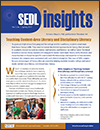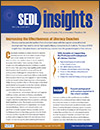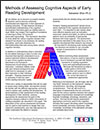SEDL's Free Briefs and Reports for Reading and Literacy
Reading and Literacy
Briefs and Reports
SEDL Insights, Vol. 3, No. 1: Teaching Content-Area Literacy and Disciplinary Literacy (2015)
This issue of SEDL Insights focuses on two types of literacy that are crucial to helping students become college and career ready: content-area literacy and disciplinary literacy.
This issue of SEDL Insights focuses on two types of literacy that are crucial to helping students become college and career ready: content-area literacy and disciplinary literacy.
SEDL Insights, Vol. 1, No. 3: Increasing the Effectiveness of Literacy Coaches (2013)
Many districts turn to literacy coaches to deliver professional development, follow-up, and support in implementing evidence-based instructional practices and programs. While literacy coaches offer an effective job-embedded professional learning mechanism for teachers, districts should also provide professional development opportunities for literacy coaches This issue of SEDL Insights how education leaders can help literacy coaches have the greatest impact at their schools.
Many districts turn to literacy coaches to deliver professional development, follow-up, and support in implementing evidence-based instructional practices and programs. While literacy coaches offer an effective job-embedded professional learning mechanism for teachers, districts should also provide professional development opportunities for literacy coaches This issue of SEDL Insights how education leaders can help literacy coaches have the greatest impact at their schools.
Secondary Content-Area Literacy: Time for Crisis or Opportunity for Reform?: Texas Comprehensive Center Briefing Paper, Number 12 (2012)
This brief examines the critical need to implement instruction at the secondary level around adolescent, or content-area, literacy. The challenge is to connect the teaching of literacy to the rest of the secondary education improvement agenda.
This brief examines the critical need to implement instruction at the secondary level around adolescent, or content-area, literacy. The challenge is to connect the teaching of literacy to the rest of the secondary education improvement agenda.
Sub-category: Early Reading
Methods of Assessing Cognitive Aspects of Early Reading Development (2002)
This article helps teachers better understand what reading abilities need to be tested and how to go about testing the essential areas that are so important to reading development.
This article helps teachers better understand what reading abilities need to be tested and how to go about testing the essential areas that are so important to reading development.




